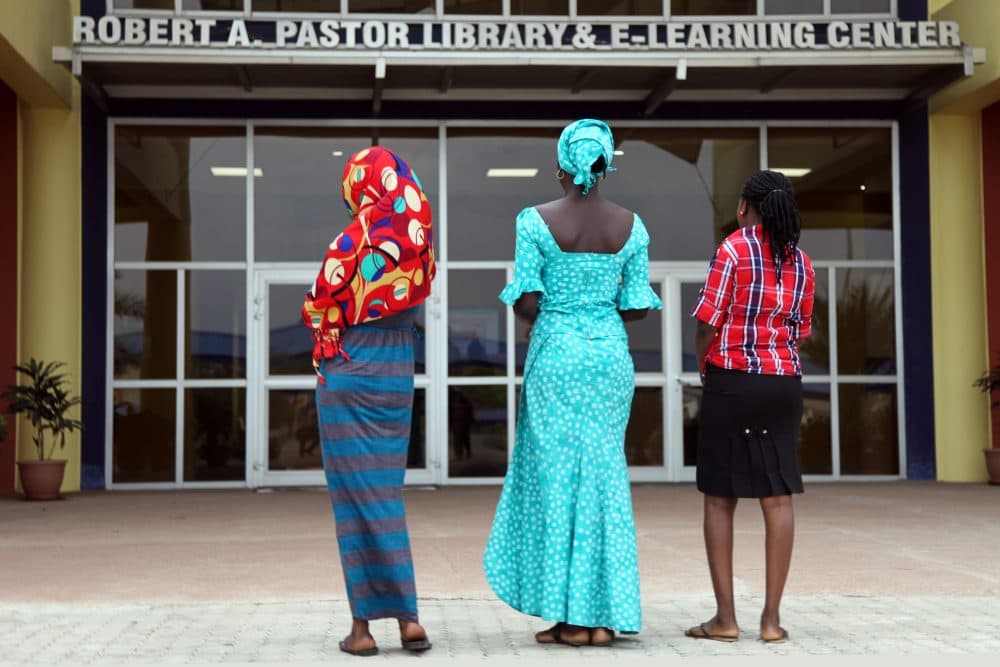Advertisement
American University Of Nigeria President On Boko Haram, Severe Famine Threat
Resume
Two years ago, the terrorist group Boko Haram kidnapped more than 200 high school girls in Nigeria. Most of those girls have never been found.
But American University of Nigeria President Margee Ensign has helped a few of the girls who managed to escape recover their lives and go back to school.
Here & Now's Lisa Mullins talks with Ensign about life in Nigeria, and the threatened famine there.
Interview Highlights: Margee Ensign
On how girls who were kidnapped recover from their experiences
"To be really honest, they don't still want to talk about it. I think they really try to just move beyond that. We know some of them were terrorized and those were still having some challenges, but they really have moved forward. They don't talk about it — they talk to each other. They're a very religious group of young women. So when things are challenging for them, they get together and hold hands and pray. And they find their strength from, not in front of each other, but if you saw them, you'll just think they're any other young people in college who are excited about what they're going to do with their life."
On how famine and starvation are impacting Nigeria
"Boko Haram has been pushed back, but the World Food Organization estimates that there may be over 4 million people on the verge of starvation. The three states most affected: Adamawa, where we are, Borno, and Yobe. There have been millions of people away from their homes — their homes are farms. Because Boko Haram has now been pushed back, they're going home. The majority were not able to plant food for this year.
We were this summer able to get seeds to seven thousand, and that was a drop in the bucket. So it's not a threat of starvation — we're in the middle of a famine. It's why I'm here in Washington, trying to raise the alarm. With everything happening around the world, from Syria to many other hot spots, it is not on any one's radar, what this region now looks like. I've seen it firsthand. I know how much more is out there. So we're here to try to raise awareness and action by the U.S. government to respond to this famine."
"For the older children, especially the boys, I've had way too many tell me, 'It was either you,' meaning our university programs, 'or Boko Haram.'"
Margee Ensign
On the goals behind testifying before Congress
"...The reason we're here is that the university has established a peace initiative years before Boko Haram's started. And we use that peace initiative, during the height of it, we were feeding almost three hundred thousand people. We have programs now [and] the most important is called 'Feed and Read.' Because in Boko Haram's wake, there are tens of thousands of children who have been orphaned. 'Feed and Read' is literarily one meal a day and teaching children how to read, to give them the semblance of a normal life and education. The waiting lists are so huge....So we came to say three things to the U.S. Congress and anyone who will listen to us.
First, we have a model the university with its peace initiative that kept young people in Yola from joining Boko Haram. We can document how we did that. The world needs to know these positive stories about how your prevent young people from joining terrorist groups.
Secondly, we're in the middle of a famine. The world we hope will listen and respond. And third, we now have peace structures throughout the northeast, the three affected states, that can get food to the grassroots level, to the most vulnerable people. We did that with seeds this summer. We can do that again with food, if anybody will listen and support us."
On the importance of recognizing challenges African nations face
"Frankly, African challenges are often not recognized in the rest of the world because we simply don't have the knowledge to understand what's happening, and we paint a very white picture of the whole continent when as you know, it's huge and many many countries. So I guess I wasn't surprised, I just hoped that someone hears this message because we can help solve this for not very much money. We can get to many of those people. Our worry is not only the people are starving, but if the U.S. and others and Nigerians don't jump on this and solve it, this cycle of violence that has really stopped could start again. The levels of desperation and of poverty are so high and there's been much progress and we're hoping that we'll get some support for this.
We're thrilled with the results, and we know if we can expand that program, we can get to these three millions in our region. The hunger for education is unlike anything I've seen. And again, if we can get the support, we can expand these programs. If might not seem much to us sitting here in the West, but for these children, this is life, this is hope, this education, this is saying. 'We care about you.' For the older children, especially the boys, I've had way too many tell me, 'It was either you,' meaning our university programs, 'or Boko Haram.'"
Guest
Margee Ensign, president of the American University of Nigeria. She tweets @MargeeEnsign. The university tweets @AUNigeria.
This article was originally published on September 16, 2016.
This segment aired on September 16, 2016.